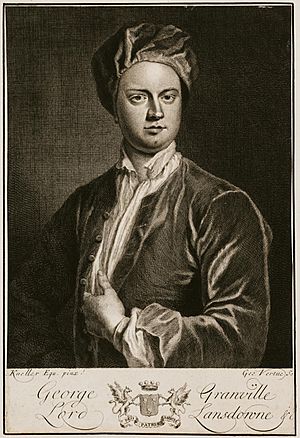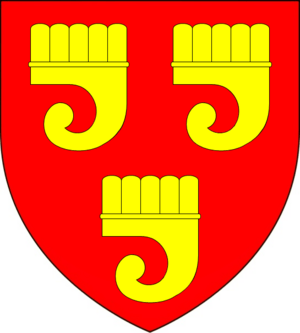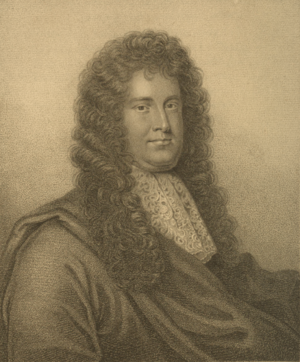George Granville, 1st Baron Lansdowne facts for kids
Quick facts for kids
The Lord Lansdowne
|
|
|---|---|

George Granville, 1st Baron Lansdowne
|
|
| Secretary at War | |
| In office 1710–1712 |
|
| Preceded by | Robert Walpole |
| Succeeded by | Sir William Wyndham |
| Personal details | |
| Born |
Birdcage Walk, London
9 March 1666 |
| Died | 29 January 1735 (aged 68) Hanover Square, London |
| Nationality | British |
| Spouse |
Mary Villiers
(m. 1711–1735) |
| Parents |
|
| Alma mater | Trinity College, Cambridge |
George Granville, 1st Baron Lansdowne (born March 9, 1666 – died January 29, 1735) was an important English politician and writer. He was a member of the Tory Party, a political group in England. He served in the House of Commons (like today's Parliament) from 1702 to 1712. After that, he became a Baron, which is a noble title, and joined the House of Lords.
From 1710 to 1712, he was the Secretary at War, a key role in the government. George Granville was also a well-known poet and a playwright. He was especially famous for his poems written when he was a student at Cambridge University.
Contents
Family Background
George Granville came from a very important family. His father was Bernard Granville, and his grandfather was Sir Bevil Grenville. Sir Bevil was a brave Royalist commander during the English Civil War. Royalists supported the King during the war.
The family changed their name from "Grenville" to "Granville" in 1661. George's uncle was John Granville, 1st Earl of Bath, who helped bring back King Charles II to the throne in 1660. These family connections meant that George Granville grew up supporting the King and the Tory party. He also had some connections to the Jacobite cause, which supported the return of the old royal family.
His Life and Work
When George Granville was ten, he went to France to study. He learned things like fencing, riding, dancing, and military science. In 1677, he started studying at Trinity College, Cambridge. While there, he wrote poems, including some to welcome Mary of Modena, who was a Duchess visiting the university.
After college, he continued to live in France for a few years. He loved literature and became friends with famous writers like John Dryden. George Granville started writing plays himself. One of his plays, The She-Gallants, wasn't very successful. However, his play The Jew of Venice (1701), which was based on William Shakespeare's The Merchant of Venice, was quite popular. His biggest success was probably The British Enchanters (1705), a big show with music.
George Granville also wrote poetry. Some people thought his poems copied other writers, but many were very popular in his time. He was also known for encouraging younger poets, like the famous Alexander Pope.
Political Journey
After his parents and uncle passed away in 1701, George Granville gained more influence. When Queen Anne became Queen in 1702, he used his connections to become a Member of Parliament (MP) for Fowey.
He worked closely with Robert Harley, another important Tory leader. George Granville was re-elected several times. A big moment in his political career was when he strongly defended Henry Sacheverell in 1710.
In 1710, he became the Secretary at War. In this role, he helped pass important laws about military supplies and finding new soldiers. In 1712, he was given the title of Baron Lansdown of Bideford. This meant he became a member of the Peerage of Great Britain and moved from the House of Commons to the House of Lords. He was one of "Harley's Dozen" – twelve new Barons created at once to help the Tory party gain more power in the House of Lords. He also became a Privy Counsellor in 1712.
When King George I came to the throne in 1714, he preferred the Whig party. Many Tories, including Lord Lansdown, lost their government jobs. Feeling upset, Lord Lansdown secretly started writing to "James III", who was known as the "Old Pretender" and wanted to be king. James III gave him several special titles, like "Duke of Albemarle" and "Earl of Bath," but these titles were not officially recognized in Great Britain.
Marriage and Later Life
On December 15, 1711, George Granville married Mary Villiers in London. She was the daughter of Edward Villiers, 1st Earl of Jersey.
He passed away in London on January 29, 1735, shortly after his wife. He was buried with her in the Church of St Clement Danes. Since he didn't have any sons, his title of Baron Lansdowne ended when he died. The special titles given to him by James III were passed to his nephew, Bernard Granville, but these titles also eventually ended.
Images for kids
 | Kyle Baker |
 | Joseph Yoakum |
 | Laura Wheeler Waring |
 | Henry Ossawa Tanner |




